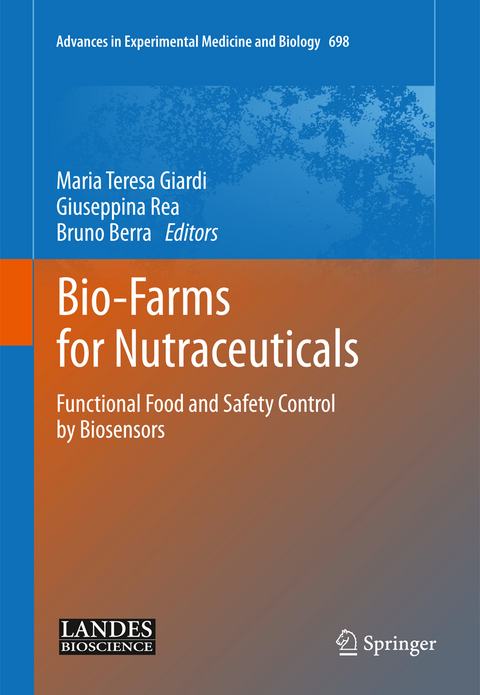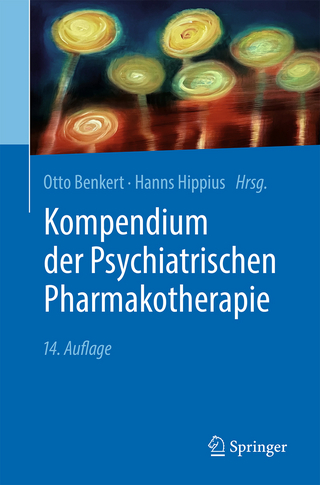
Bio-Farms for Nutraceuticals
Springer-Verlag New York Inc.
978-1-4419-7346-7 (ISBN)
MARIA TERESA GIARDI, PhD, is a Research Manager at the National Council of Research (CNR) in Rome, Italy. Her background is in organic-industrial chemistry, and she has extensive experience in molecular biology; modification of photosystem II to increase its resistance to high temperature and sensitivity to radiation; signal transduction in optical and electrochemical biosensors; protein stabilization and utilization in biosensor design, and analytical procedures in general. She is a referee for the US Department of Agriculture for industrial projects. She has worked in various research institutions and research and development companies both in Europe and the USA. She is a supervisor or coordinator of a number of national and international projects in the field of biosensors: European Agency Life V project, 20xx-2004; a European Space Agency project involving space flight in 2005; a NATO “linkage grant”, dedicated to sensors based on plant and microrganisms. GIUSEPPINA REA, PhD, is a molecular biologist and is on the permanent staff of CNR-IC. She is an expert in the molecular mechanisms involved in plant defense responses and has many years of experience in plant molecular biology, biochemistry, biotechnology and protein engineering techniques. She is project monitor of the CNR project Biotechnological Applications of Oxygenic Photosynthetic Organisms in the Agro-food Field and Space Environment, and the EU projects Multibioplat and Sensbiosyn, aimed at producing bacteria and algae with improved photosynthetic performance to exploit them in biological farms for nutraceutical applications and biosensing elements in biosensor development. Her research activities are mainly focused on Chlamydomonas reinhardtii and Rhodobacter sphaeroides. She is advisor to several PhD students in Plant Biotechnology working in the fields of exobiology, nutraceutics and biosensors. BRUNO BERRA, PhD, received his academic degree in Chemistry from the University of Pavia, Italy.He is Professor f.r. of Biochemistry at the University of Milan and works at the Department of Molecular Sciences Applied to Biosystems in the Faculty of Pharmacy. During his active teaching career he taught Biochemistry, Molecular Biology, Nutrition Biochemistry and Cosmetology. His most important research areas include: isolation, fractionation, purification and analysis of glycolipids from brain, extranervous tissues and biological fluids; biochemical diagnosis of sphingolipidosis and follow-up of Gaucher’s patients receiving enzyme replacement therapy; nutritional biochemistry with reference to fats and antioxidants; membrane component studies in spontaneous or induced degenerative processes, with particular reference to solid and tumor cells; skin biochemistry and molecular biology of the skin; and space biology. He is a member of numerous national and international scientific organisations including the Italian Society of Biochemistry (1957-2004), the Italian Society for Fat Research, the International Conference of Biochemistry of Lipids (ICBL), the Euro Fed Lipid, the American Oil Chemist’s Society, and the American Society of Diabetes.
The NUTRA-SNACKS Project: Basic Research and Biotechnological Programs on Nutraceutics.- Overview of Diet-Gene Interactions and the Example of Xanthophylls.- Therapeutic Potential of Dietary Polyphenols against Brain Ageing and Neurodegenerative Disorders.- Plant Phenolics in the Prevention and Treatment of Cancer.- Endogenous Antioxidants and Radical Scavengers.- A Nutritional Strategy for Reducing Disease and Obesity Risks.- Dietary Phytochemicals and Human Health.- Bioactive Compounds from Northern Plants.- Nutraceutical Use of Garlic Sulfur-Containing Compounds.- Genetic Engineering to Enhance Crop-Based Phytonutrients (Nutraceuticals) to Alleviate Diet-Related Diseases.- Perspective for the Use of Genetic Transformants in Order to Enhance the Synthesis of the Desired Metabolites: Engineering Chloroplasts of Microalgae for the Production of Bioactive Compounds.- Biological Elicitors of Plant Secondary Metabolites: Mode of Action and Use in the Production of Nutraceutics.- Hairy Root Cultures for Secondary Metabolites Production.- Plant Tissue Culture—An Opportunity for the Production of Nutraceuticals.- Plant Cell Cultures: Bioreactors for Industrial Production.- Determination of the Antioxidants’ Ability to Scavenge Free Radicals Using Biosensors.- Biosensors for the Determination of Phenolic Metabolites.- Methods for the Determination of Antioxidant Capacity in Food and Raw Materials.- Analytical Methods for the Extraction and Identification of Secondary Metabolite Production in ‘In Vitro’ Plant Cell Cultures.- Biosensors for Functional Food Safety and Analysis.- Biosensors for Secondary Metabolites, Two Case Studies: Ochratoxin A and Microcystin.- Biosensors as Analytical Tools in Food Fermentation Industry.- An Overview of the Functional Food Market:From Marketing Issues and Commercial Players to Future Demand from Life in Space.- Legislation on Nutraceuticals and Food Supplements: A Comparison between Regulations in USA and EU.
| Reihe/Serie | Advances in Experimental Medicine and Biology ; 698 |
|---|---|
| Zusatzinfo | XXVII, 334 p. |
| Verlagsort | New York, NY |
| Sprache | englisch |
| Maße | 178 x 254 mm |
| Themenwelt | Medizin / Pharmazie ► Medizinische Fachgebiete ► Pharmakologie / Pharmakotherapie |
| Medizin / Pharmazie ► Studium | |
| Naturwissenschaften ► Biologie | |
| ISBN-10 | 1-4419-7346-X / 144197346X |
| ISBN-13 | 978-1-4419-7346-7 / 9781441973467 |
| Zustand | Neuware |
| Haben Sie eine Frage zum Produkt? |
aus dem Bereich


